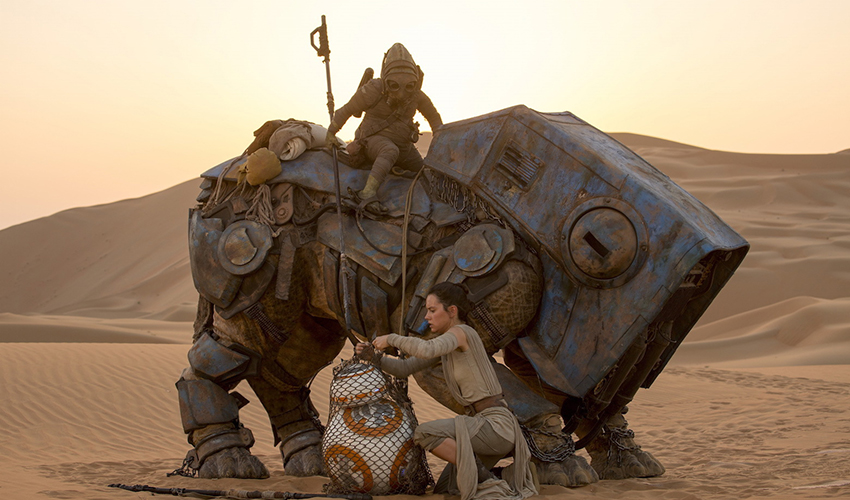Cinema professor says 'Star Wars' saga awakens mythical forces

A scene from "Star Wars: The Force Awakens," in which Rey readies BB-8 for transport with the scavenger Teedo and his semi-mechanical Luggabeast. Photo credit: StarWars.com
We've been hearing about it for more than a year -- and it's everywhere, not just in some galaxy far, far away.
If you've turned on a television, walked through a toy store or riffled through magazines while waiting in line at the grocery store lately, you know that "Star Wars: The Force Awakens," the newest film in the "Star Wars" saga, opens in theatres Dec. 18.
Amid all the hype, it may be easy to lose sight of the reason the "Star Wars" series is so beloved. San Francisco State University Professor of Cinema and film historian Steven Kovacs said multiple factors contribute to the longstanding popularity of the original "Star Wars" movie.
"It's a very important film in terms of the special effects," Kovacs said. "It was the first film that used the most advanced technology of the time and succeeded in creating a believable science fiction world."
"It also balanced the plot tension with a sense of humor that engaged the audience, with endearing characters like C-3PO and R2-D2, based on comic figures in Kurosawa's "Hidden Fortress" and reminiscent of secondary characters like Sancho Panza in "Don Quixote," he added.
More importantly, Kovacs said, much like Joseph Campbell's hero's journey, writer and director George Lucas "created an archetypal myth, with a hero on a journey, a quest," which began initially to save the heroine -- a real princess.
As the story unfolds, conflicts continue to escalate between good and evil, as the Rebel Alliance battles the Empire and the insidious Dark Side.
"'Star Wars' is mythical, like a fairy tale, and creates a believable world with a true hero and heroine and villain -- that's the main reason the original was such a phenomenon and so successful," Kovacs said.
Of all the films in the "Star Wars" franchise, the first two films of the initial trilogy, "Star Wars" and "The Empire Strikes Back," met with the highest critical acclaim, while the last film, the animated prequel "Star Wars: The Clone Wars," received the worst reviews of any in the franchise.
Typically, Kovacs said, "sequels aren't as successful as the original film because they're hard to duplicate. Sometimes they really misfire."
But in the case of the "Star Wars" franchise, "It has been going strong for 40 years -- we have all grown up with it. Many of the people who worked on the original film are still involved today, which lends a continuity to the saga," he said.
"They have created a mythical world that is very rich, and with each movie you learn more about that world and its many characters.
"In the end, the individual movies create a fantasy world, a totality that is greater than the sum of all the films," Kovacs concluded.
SF State also has a close campus connection to the soon-to-be released film -- alum Chris Scarabosio was the re-recording mixer on "Star Wars: The Force Awakens."